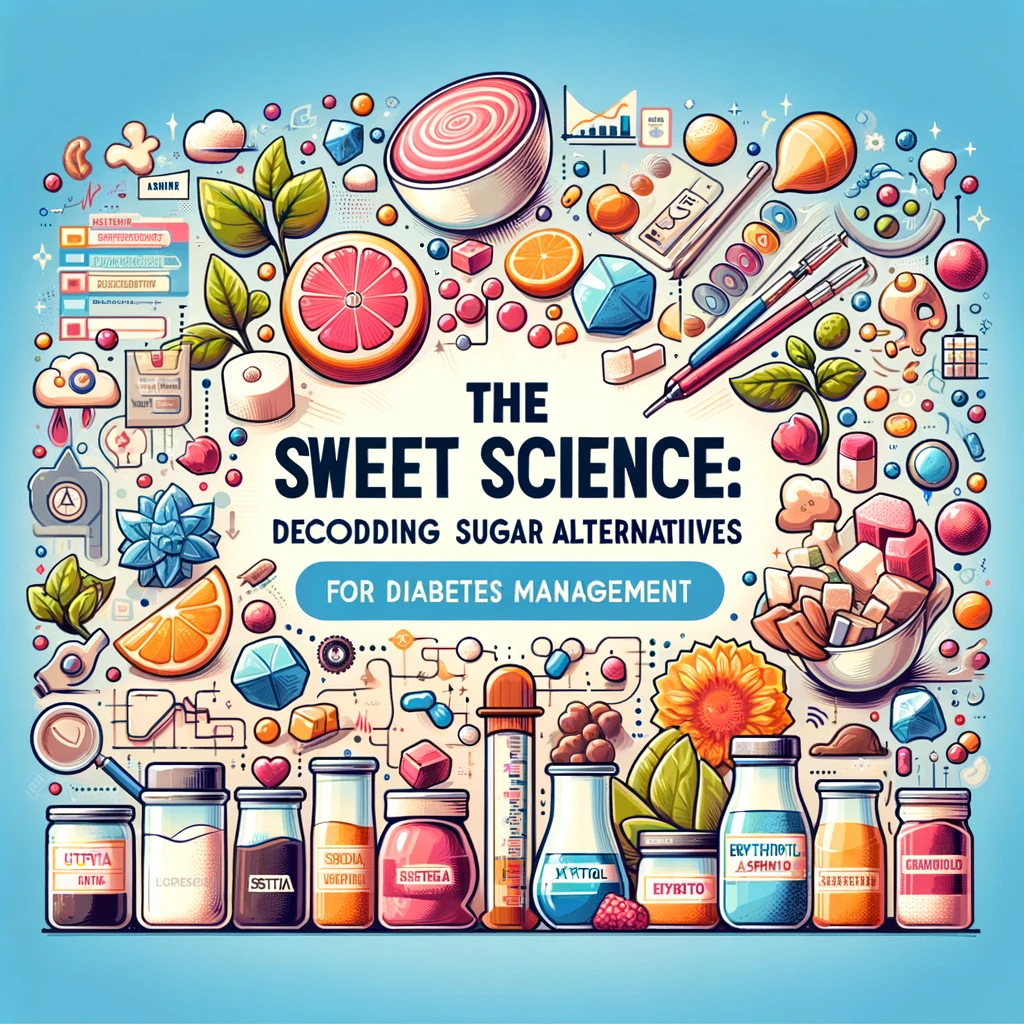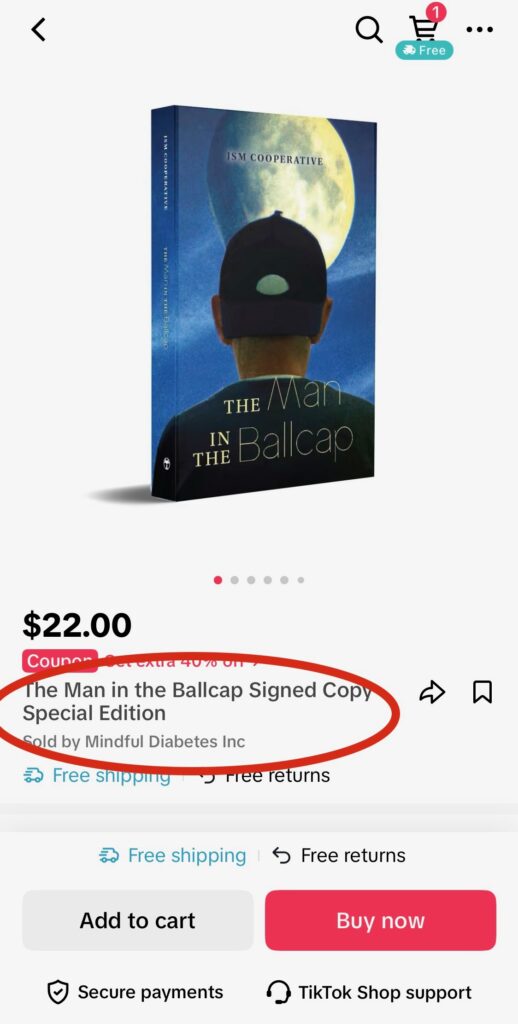
Prefer to listen?
The Sweet Science: Decoding Sugar Alternatives for Diabetes Management 🍬🔬
Hello and welcome back to Pathways to Wellness! 🌟 Here, we’re all about empowering you with knowledge for better diabetes management. Today, we’re sweetening the deal with a crucial topic – finding the healthiest alternative to sugar. 🌿🍰 For those navigating the world of diabetes, choosing the right sugar alternatives can make a significant difference. Join us as we explore various natural and artificial sweeteners 🍯🧪, examining their impact on blood sugar levels, health benefits, and potential risks. Our journey into the world of healthy sugar alternatives 🍬🌱 will provide insights to help you make informed choices for your health.
❤️ Join Us in Preventing Type 3 Diabetes
Your gift supports scientifically backed prevention programs, cognitive-health education, and AI tools that help families reduce the risk of Alzheimer’s-like symptoms linked to diabetes.
Mindful Diabetes Inc. is a 501(c)(3) nonprofit — all donations are fully tax-deductible.
Understanding Your Options in Sugar Alternatives 🧐
When it comes to managing diabetes, the choice of sweetener is more than a matter of taste; it’s a health decision. Here’s a breakdown of some popular sugar alternatives:
Stevia (🌿): Derived from the leaves of the Stevia plant, this zero-calorie natural sweetener doesn’t raise blood sugar levels. It’s a favorite in the diabetes community but note that it can have a slightly bitter aftertaste.
Xylitol (🍬): Found in fruits and vegetables, Xylitol is a sugar alcohol with a sweetness similar to sugar but fewer calories. It’s great for dental health but can cause digestive issues in large amounts.
Erythritol (🧊): Another sugar alcohol, Erythritol, has almost no calories and doesn’t spike blood sugar. It’s known for its easy digestibility and minimal aftertaste.
Aspartame (🧪): A popular artificial sweetener, Aspartame is calorie-free. It’s suitable for adding to drinks and desserts, but not everyone prefers its taste, and it’s unsuitable for people with phenylketonuria (PKU).
Balancing Blood Sugar and Sweetness 🍭
Managing diabetes means keeping a close watch on how foods affect your blood sugar. Here’s how these sweeteners stack up:
Natural vs. Artificial: Natural sweeteners like Stevia and Erythritol generally have a minimal impact on blood sugar levels. Artificial sweeteners, while also low in calories, can sometimes affect insulin sensitivity.
The Glycemic Index Factor: Stevia and Erythritol have low glycemic indexes, making them excellent choices for maintaining stable blood sugar levels.
Weighing the Pros and Cons 🤔
Every sweetener has its upsides and downsides. Consider these factors:
- Taste Profile: Stevia is sweet with a distinctive aftertaste, while Xylitol and Erythritol taste more like sugar but may have digestive side effects.
- Health Impacts: Pay attention to how your body responds to different sweeteners, especially if you have pre-existing health conditions.
🌟 Try Our Free Wellness Tools!
Set the high score in our Mindful Eating Game, explore JEIR, or dive deeper into the science behind our AI-driven prevention tools!
🤖 Try JEIR — Your AI Wellness Guide 🎮 Play the Mindful Eating Game 📘 Read About the Mindful Eating Game 🤖📘 Read About the AI Behind JEIRIncorporating Sweeteners into Your Diet 🥣
Switching to sugar alternatives doesn’t have to be complicated:
- Start Small: Gradually introduce these sweeteners into your diet.
- Cooking and Baking: Experiment with different sweeteners in your recipes. Remember, heat can alter the taste and effectiveness of some substitutes.
- Mindful Consumption: Even the best sugar alternative should be consumed in moderation.
Backed by Science 🔬
Research supports the use of certain natural sweeteners like Stevia and Erythritol as healthier options due to their low impact on blood sugar and minimal side effects.
High Fructose Corn Syrup: A Sweet Trap? 🍯🚫
In the search for sugar alternatives, one commonly encountered ingredient is high fructose corn syrup (HFCS). Despite its prevalence in many processed foods, HFCS is not a recommended substitute for sugar, especially for those managing diabetes. Here’s why:
Understanding Fructose Metabolism 🧬
- Unique Processing in the Body: Fructose, the primary component of HFCS, is metabolized differently than other sugars. Unlike glucose, which is used by almost every cell in the body, fructose is primarily processed in the liver.
- Liver Overload: High intake of fructose can overload the liver, leading to several metabolic issues. The liver converts excess fructose into fats, which are released into the bloodstream as triglycerides, increasing the risk of fatty liver disease and cardiovascular problems.
The Issues with HFCS Compared to Sucrose 🍬
- Higher Fructose Content: HFCS often contains more fructose than sucrose (table sugar), which is usually 50% glucose and 50% fructose. This higher proportion of fructose in HFCS can amplify the negative metabolic effects.
- Rapid Absorption: HFCS can be absorbed more rapidly than other sugars, potentially leading to quicker and higher spikes in blood sugar – a concern for diabetes management.
Problems with Excessive Fructose and Sucrose Intake 😟
- Impaired Blood Sugar Regulation: High consumption of fructose, particularly from HFCS, can contribute to insulin resistance, a key factor in the development of Type 2 Diabetes.
- Increased Appetite and Weight Gain: Fructose consumption doesn’t reduce hunger hormones like glucose does, potentially leading to increased caloric intake and weight gain.
- Risk of Chronic Diseases: Regularly consuming high levels of HFCS is linked to an increased risk of obesity, fatty liver disease, diabetes, and heart disease.
Conclusion: Why HFCS Isn’t a Good Substitute 📉
High fructose corn syrup, due to its unique metabolism and potential health risks, is not a healthy alternative to sugar. Its propensity to impact liver function, blood sugar regulation, and overall metabolic health makes it an ingredient best limited or avoided in a diabetes-conscious diet.
📖 Continue Exploring 🌐
Don’t stop here! Dive deeper into the fascinating connection between mental wellness and physical health in our upcoming blogs. There’s always more to discover and explore.
💌 Stay Informed and Inspired 📬
Subscribe to our newsletter for the latest insights, tips, and updates on the mindful path to better health. Together, we’ll continue to unlock the secrets of a balanced and vibrant life.
Thank you for your continued support and readership. Here’s to a healthier, happier you! 🌈💚




